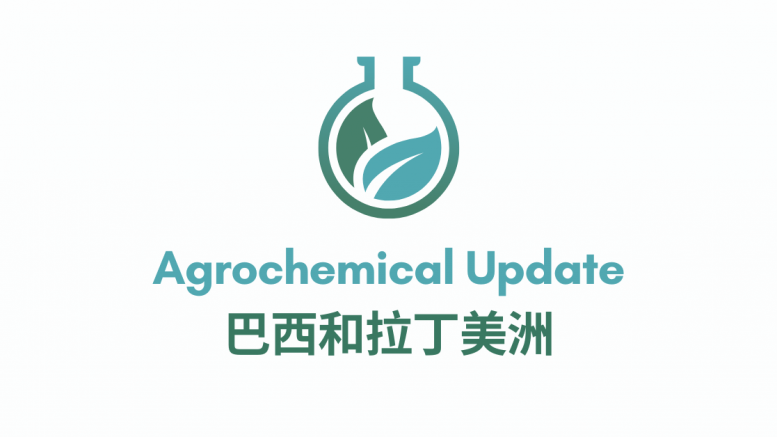Fertilizer prices in Colombia dropped 6.71% in May
Brazil
Ministry of Agriculture approved 21 pesticide registrations of technical products and pre-mixtures, 18 of which are equivalent technical products, and two new technical products based on fluindapyr (FMC) and flucarbazone-sodium (UPL). (MAPA)
The National Association for the Diffusion of Fertilizers promotes the 10th edition of the Brazilian Fertilizer Congress, on August 29th, 2023, both in person and online. (ANDA)
Syngenta concluded the acquisition of Ultrafine’s factory in Indaiatuba, State of São Paulo. The acquisition was announced in January of 2023 and finalized on July 3rd. The company also just announced the acquisition of Feltrin Sementes. (Syngenta)
Senator Cid Gomes, rapporteur of the Project about the periodic reassessment of pesticides, Bill No. 494/2022, in the Environment Committee, issued a favorable opinion for the approval of the project. The Bill provides for the periodic reassessment of pesticides, their components, and related products, that should take place every 10 years. The period may be reduced in specific cases, such as “when there are signs of reduced efficacy, changes in risks to human health or the environment”, among other situations. According to the Bill, the reassessment period will be of five years for pesticides considered highly toxic or extremely toxic. (National Union of Agricultural Federal Inspectors)
Fernando Maluf, oncologist, founder of the Instituto Vencer o Cancer, said it is not possible to say that pesticides increase the chances of cancer. “We have studies in preliminary stages that suggest that pesticides can have a carcinogenic effect. The fact is that we don’t have studies that clearly say that they are bad. We have a suspicion that all foods, whether because of hormonal stimuli or preservatives, may be the cause of cancer… There are no clearly resolved studies”, according to Maluf. (Programa Roda Viva)
Port of Paranaguá, State of Paraná, should unload 9 million tonnes of fertilizers by the end of the year, according to the Union of the Fertilizer and Agricultural Correctives Industry. (Sindiadubos)
Osny Garcia Jr. is the new business director of the “south cluster” of Lavoro Agro. Gustavo Zacante Orlando is the new director of B2B business at the company. (Lavoro Agro)
According to Kynetec Brasil consulting company, UPL was the biggest supplier of foliar insecticides to protect soybeans in Brazil during the 2022/23 season. UPL inputs were applied to 49.8 million hectares of soybean, representing 22% of the market. (Kynetec Brasil; UPL)
Single Federation of Oil Workers – FUP requests Petrobras to break contracts made with Unigel and repurpose the Nitrogen Fertilizer Factories located in Laranjeiras, State of Sergipe, and Camaçari, State of Bahia. According to the Federation, there are no positive perspectives with the permanence of Unigel, that has had difficulties in managing the factories. (FUP)
Ourofino Agrociência announced its financial statement for the fiscal year 2022/23. The company invested US$ 4.72 million in storage facilities in the State of Minas Gerais during the period. Adjusted net income was US$ 48.1 million, an increase of 68.6% compared to the previous year. Net revenue increased 14.4%, to almost US$ 410 million. Marcelo Abdo, CEO of Ourofino, said the moment is “stable”, and allows an expansion plan focused on proprietary patents, new insecticides, herbicides and fungicides. According to Abdo, profit margins tend to be lower for companies that don’t have patented products. (Ourofino Agrociência)
In compliance with court decisions, Anvisa approves toxicological evaluations of 2,4-D technical (Proregistros); and trifloxystrobin technical (CAC). (Anvisa)
eB Capital, an investment manager, announced an investment of US$ 123.22 million to produce biomethane and fertilizers from waste in the city of Triunfo, State of Rio Grande do Sul. The project is a partnership with Sebigás Cótica. (eB Capital; Sebigás Cótica)
Professionals from the Federal Laboratory for Agricultural Defense in the State of São Paulo, from MAPA, attended the international symposium about pesticides in Germany, promoted by the International Collaborative Council for Pesticide Analysis. “Due to the growing demand for the use of biological pesticides, the need to establish parameters for control was also widely discussed in order to guarantee to the end users the product’s efficacy and safety in regards to public health and the environment…”, according to the federal agricultural inspector Vanessa Gonçalves dos Santos. (LFDA/SP; MAPA; CIPAC)

Latin America
From April 2021 to March 2022, fertilizer prices in Colombia
Bolivia‘s state-owned company, Yacimientos Petrolíferos Fiscales Bolivianos, declared void the tender for the construction of a second ammonia and urea factory, with an estimated investment of US$ 1.29 billion. Analyst and former minister of hydrocarbons Álvaro Ríos said that building a second urea factory is difficult because it is necessary to assess how much gas will be used, who will finance the project and where the plant will be located. (YPFB)
Construction of the Granulated Fertilizer Production Plant in Cochabamba, Bolivia, should be concluded in August. The factory will have a production capacity of approximately 60,000 tonnes/year of NPK and of slow release granulated urea, two of the most sold fertilizers in the world. “It is a project with a significant impact because with its production we will cover 100% of the NPK demand and it will be possible to export the surplus”, said the manager of the Bolivian Hydrocarbon Industrialization Company, Alejandro Gallardo. (EBIH)
According to Javier Patiño, RIA Consultores director, Argentin

READ MORE:

